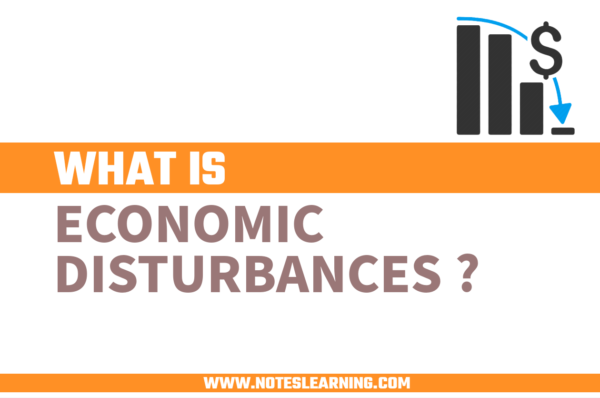Introduction
Economic disturbance is anything that leads to disruptions and irregularities in an economy . It can be any event or situation, natural or unnatural, that causes deviation from the expected economic conditions.
Raghuram Rajan, an Indian economist and a former governor of the Central Bank of India, has defined economic disturbance as a disruption in the business cycle. He defines economic disturbance as fluctuations in economic activities characterized by periods of expansion (boom) followed by contractions (recession or depression).
Similarly, Hyman Minsky, an renowned economist, defines economic disturbance as the result of structural imbalances in the economy. This means, disturbance in an economy can occur when there is excessive speculation, overleveraging , and a buildup of debt in the financial system.
Economic disturbance is a prevalent phenomenon in the study of the economy. Some of the very common economic disturbances are:
| Financial Crisis | Recession | Demographics Shifts |
| Policy Changes | Technological Disruptions | Global Economic Shocks |
| Pandemics | Natural Disasters | Labor Market Disturbances |
| Trade Imbalances | Government Fiscal Crisis | Environmental Issues |
| Financial Market Volatility | War and Geopolitical Conflicts | Energy and Commodity Price Volatility |
Different Economic Disturbances
The following tables present the different events and factors that cause economic disturbance into their respective categories. All the factors directly or indirectly impact the normal functioning of the economy.
| Financial Crisis | Banking Crisis Stock Market Crashes Currency Crises Sovereign Debt Crises |
| Recession | Economic Contractions Persistent High Unemployment Decline in consumer and business spending |
| Demographics Shifts | Aging populations Population growth or decline Migration patterns |
| Policy Changes | Changes in tax policies Monetary policy adjustments Trade Policy Shifts Regulatory changes |
| Technological Disruptions | Automation and Job Replacement Rapid Technological Advancements Industry Disruptions |
| Pandemics | Disease Outbreak Pollution and Environment Degradation Natural Resource Scarcity |
| Global Economic Shocks | Oil price shocks Global Economic Downturns Financial Contagion |
| Government Fiscal Crisis | Excessive government debt and deficits Budgetary Challenges and austerity measures |
| Labor Market Disturbances | High and persistent unemployment Labor strikes and disputes Skill gaps and mismatches |
| Financial Market Volatility | Rapid and large scale fluctuations in financial markets Asset price bubbles and crashes |
| Trade Imbalances | Trade deficits and surpluses Trade disputes and protectionism Exchange rate fluctuations |
| Geopolitical Conflicts | War and armed conflicts Trade disputes and tariffs Sanctions Terrorism |
| Energy and Commodity Price Volatility | Fluctuations in prices of oil, gas and other commodities Energy supply disruption |
| Environmental Issues | Climate change impacts Pollution and environmental degradation Natural resource scarcity |
| Natural Disasters | Earthquakes Hurricanes Floods Wildfires |
Characteristics of Economic Disturbances
Abruptness
Economic disturbances are abrupt in nature. Such events have limited predictability despite various economic indicators. Such disturbances emerge rapidly and it is difficult to predict the event accurately. Economic indicators support the environment of the happening but it is challenging to prepare for their impact.
Diverse Triggers
There are various economic disturbances and different disturbances have different triggers. Different events will trigger different disturbances. Similarly, changes in internal and external environments trigger different disturbances. The economic disturbance of 2023 was triggered by the COVID, followed by inflation and economic contractions. Similarly, the dot com bubble was triggered by the unanticipated technological disruptions.
Uncertainty
This is a defining characteristic of economic disturbance. The future events are uncertain. No one can anticipate the true impact of certain natural or artificial change in the economy. A slightest change in trade policy can change the course of economic relations between two countries.
For instance, trade sanctions between the U.S. and China have changed the course of business between the U.S. and China. Top of it, as a geopolitical stance, India now has become ahead of China for trade preference.
Spillover Effects
Economic disturbance can be contagious. This means, one effect could lead to multiple and prolonged economic downturns. All the economic propositions are interrelated and impact on one factor could lead to spillover effect, amplifying the disturbance. The Global Financial Crisis of 2007-2008 is an example of the spillover effect of economic disturbance.
For instance, international banks invested more on toxic assets in the housing market. When the housing crisis hit the U.S. market, investors lost confidence in the banking system and the banks failed. The global banking system eroded and the credit system got affected, creating the global crisis.
Sectoral Disparities
Disturbances impact all the sectors of economy. One incident can have an impact on an individual, organization, institution or a business level differently. Some individuals or industries can be resistant and prepared for disturbances while others can be vulnerable and sensitive.
For instance, the financial sector may experience turmoil during the financial crisis. Meanwhile, the agricultural sector may have the least effect.
Duration
There is no certainty of duration for economic disturbances. There may be short-lived irregularities that are brief and temporary. Such irregularities have a mild impact. Natural disasters, supply chain disruptions, energy price shocks, temporary financial market volatility etc. are short-lived irregularities.
There are prolonged crises which may last for years and decades. They have a great impact on the life of individuals and the economy. Such prolonged irregularities may cause structural shifts in the economy. Financial crises, Recessions, Sovereign Debt Crisis, Structural Unemployment, geopolitical conflicts are some of the prolonged economic disturbances.

